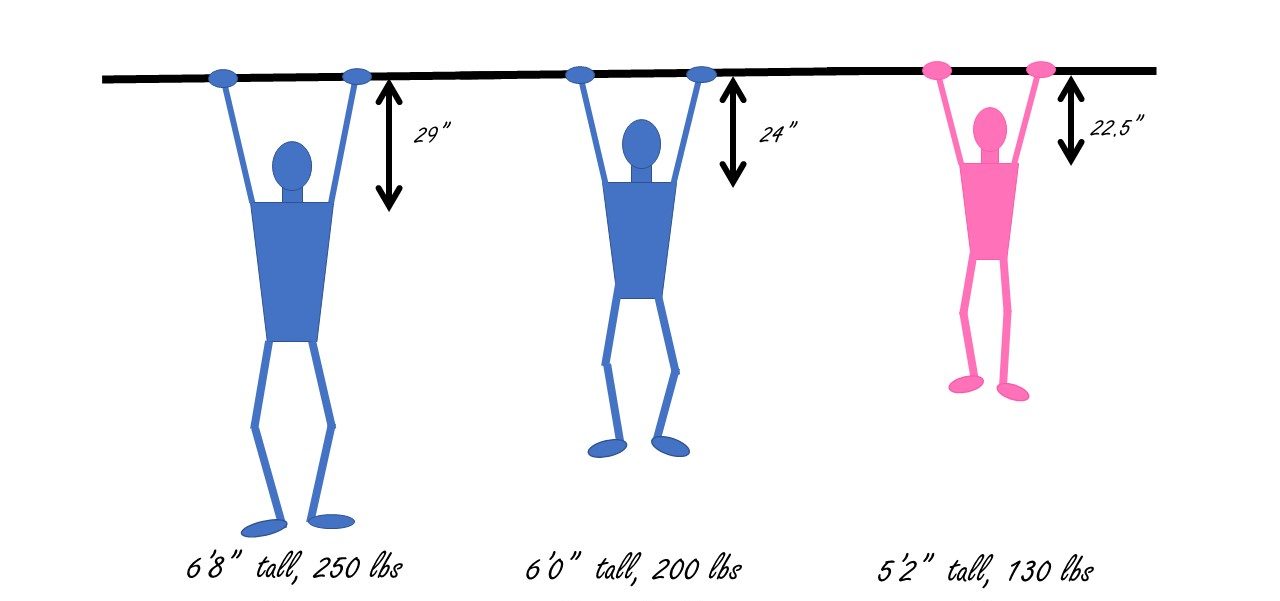Have you ever wondered if doing pull-ups can make you taller or stunt your growth? It’s a common question, especially among younger individuals who are still growing. In this article, we’ll discuss the effects of pull-ups on height growth in more detail, so you can understand the truth behind this popular belief.
There is a common myth that doing pull-ups can actually stunt your growth, especially if you start performing them at a young age. However, the truth is that pull-ups do not have any direct impact on your height.
Genetics and other factors like nutrition and hormones play a major role in determining your height. Pull-ups are a great exercise for building upper body strength and improving posture, but they do not directly affect the growth plates in your bones that determine your height. In fact, engaging in regular exercise, including pull-ups, can promote healthy bone development, which can indirectly contribute to better overall growth.
So, if you enjoy doing pull-ups, don’t worry they won’t make you shorter! In the article, we’ll explore more about the different factors that affect height growth and provide some tips on how to maximize your potential height. So, keep reading to learn more! If you’ve ever wondered whether doing pull-ups can affect your height growth, you’re not alone.
Many people believe that certain exercises, such as pull-ups, can either make you taller or stunt your growth. In this article, we will explore the effects of pull-ups on height growth and delve into the role of spinal compression, the impact on posture and spine alignment, and other factors that influence height growth.

The Role of Spinal Compression
Understanding Spinal Compression
Before we dive into the effects of pull-ups on height growth, it’s essential to understand what spinal compression is. Spinal compression refers to the force exerted on the spine, typically due to activities such as running, jumping, or weightlifting. During these activities, the vertebrae in the spine are subjected to increased pressure, which can potentially affect height growth.
Effects of Spinal Compression on Height Growth
Contrary to popular belief, spinal compression alone does not play a significant role in height growth. While activities like pull-ups may contribute to spinal compression, they do not directly impact the lengthening of your bones. The primary determinants of height growth are your genetics and the growth plates in your bones, not spinal compression.
Understanding Spinal Compression
Definition of Spinal Compression
Spinal compression occurs when the vertebrae in your spine are compressed or squeezed together. This compression can happen due to various factors, including poor posture, obesity, or heavy physical activity. The pressure placed on the spine during these activities can lead to temporary height loss, but it does not affect long-term height growth.
Causes of Spinal Compression
Several factors can contribute to spinal compression, including poor posture, injury, or conditions such as osteoporosis. While activities like pull-ups can sometimes put pressure on the spine, maintaining good form and having a strong core can help minimize the risk of spinal compression-related issues.

Effects of Spinal Compression on Height Growth
Misconceptions about Height Growth
It’s important to clarify some misconceptions about height growth. Many people believe that performing pull-ups can make them taller or stunt their growth. However, these beliefs are not based on scientific evidence. Height growth is primarily determined by your genetics and the growth plates in your bones, not by exercises like pull-ups.
Realistic Expectations
While pull-ups may not directly impact your height growth, they can contribute to overall physical fitness and posture, which indirectly influences how tall you appear. By strengthening your back and core muscles through pull-ups, you can improve your posture, which can make you appear taller and more confident.
Impact on Posture and Spine Alignment
The Importance of Good Posture
Maintaining good posture is crucial for overall health and well-being. Good posture ensures proper alignment of the spine, reduces the risk of injuries, and allows for optimal functioning of the body. Slouching or hunching can lead to spinal misalignment and potential issues with height perception.
Effect of Pull-Ups on Posture
One of the significant benefits of pull-ups is their ability to strengthen the core muscles, including the muscles that support the spine. By regularly engaging in pull-ups, you can improve your posture and promote spine alignment. Strong core muscles help maintain an upright position, reducing the likelihood of slouching or hunching.

The Importance of Good Posture
Benefits of Good Posture
Having good posture offers numerous benefits beyond just appearing taller. Good posture can relieve back and neck pain, improve breathing and digestion, enhance athletic performance, and even boost self-confidence. By practicing good posture, you can optimize your overall health and well-being.
Consequences of Poor Posture
Conversely, poor posture can lead to a range of negative consequences. Slouching or hunching puts excessive stress on the spine, leading to muscle imbalances, back pain, and potential issues with body mechanics. Over time, poor posture can affect your height perception and overall physical appearance.
Effect of Pull-Ups on Posture
Strengthening Core Muscles
Pull-ups are an excellent exercise for strengthening the core muscles, including the muscles in the back and abdomen. These muscles play a crucial role in maintaining good posture and supporting the spine. By regularly incorporating pull-ups into your workout routine, you can develop stronger core muscles, which can, in turn, improve your posture.
Improvement in Spine Alignment
A strong and stable core contributes to better spine alignment. By engaging in pull-ups and other exercises that target the back and core muscles, you can enhance your spine’s alignment, alleviating potential issues with height perception. Improved spine alignment can make you appear taller and help you maintain an upright posture effortlessly.

Unrelated Factors Influencing Height Growth
While pull-ups may not directly impact height growth, there are several other factors that influence your overall height.
Diet and Nutrition
Proper nutrition is crucial for ensuring optimal height growth. Calcium, vitamin D, protein, and other essential nutrients play a vital role in bone development. A balanced diet that includes a variety of foods can provide the necessary nutrients for healthy height growth.
Genetic Factors
Height is largely influenced by genetics. Your genes determine the potential height that you can reach. While you can’t change your genetic makeup, leading a healthy lifestyle, including regular exercise and a balanced diet, can help you maximize your genetic potential.
Diet and Nutrition
Nutrients Essential for Height Growth
To support optimal height growth, it’s important to consume a diet rich in essential nutrients. Calcium, vitamin D, protein, zinc, and phosphorus are particularly important for bone development. Foods such as dairy products, leafy greens, lean meats, fish, eggs, nuts, and legumes are excellent sources of these nutrients.
Impact of Malnutrition
Malnutrition or deficiencies in essential nutrients can stunt growth and lead to height-related issues. Inadequate intake of nutrients during childhood and adolescence, when height growth is most significant, can have long-lasting effects on your height potential.
Conclusion
In conclusion, pull-ups alone do not directly impact height growth. Height is primarily determined by genetic factors and the growth plates in your bones. However, pull-ups can indirectly influence your height perception by improving posture, strengthening core muscles, and promoting overall physical fitness.
While pull-ups alone may not make you taller, leading a healthy lifestyle that includes regular exercise, a balanced diet, and proper posture can contribute to your overall well-being and optimize your height potential. Incorporating pull-ups into a well-rounded fitness routine can help improve your posture, strengthen your core muscles, and enhance your overall appearance.
Remember, your height does not define you. Embrace and celebrate your unique attributes and focus on living a healthy, active life.




